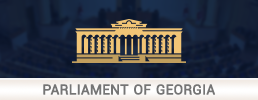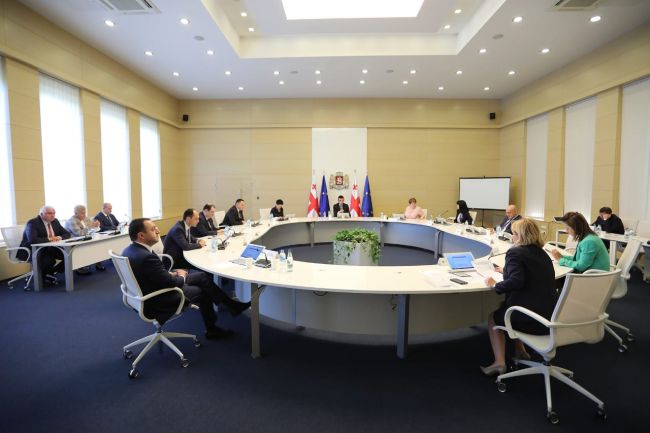2020-09-24
What is taking place today, especially in Adjara, is the result of increased mobility; however, we must all understand that this was absolutely predictable and we were preparing for this, Georgian Prime Minister Giorgi Gakharia stated at the session of the government.
The head of the government discussed the epidemiological situation in the country, noting that there is a sharp increase in the number of infections but that this was to be expected.
"We have always been absolutely open and sincere with our citizens and we have always said that lifting restrictions would logically lead to an increase in the number of infections. Of course, what is taking place today, especially in Adjara, is the result of increased mobility; however, we must all understand that this was absolutely predictable and we were preparing for this. We have consistently stated from the very beginning that the fight against the virus consists of several stages. Of course, our first goal was containment, which meant containing the spread of the virus over time as much as possible. This had a logical explanation, whereby at the time knowledge about the virus in the world, let alone in Georgia, was minimal; of course, resources were minimal as well, therefore we needed to buy some time, which we did consistently and effectively. As a result, as you know, we saved the lives of many of our citizens. This was recognized internationally as well and is still recognized to this day. Even today, Georgia remains a green country," the Prime Minister noted.
According to the head of the government, when talking about the stage of risk management and adaptation, this includes the stage of rapid detection and slowing down the spread of the virus, clinical management, and the swift return of people to normal life.
"Today, we are at the stage of adaptation and management. During the first stage, our main goal was to hinder the spread of the virus over time. We made a decision and a state of emergency was declared in the country; mobility was drastically reduced, which gave us the opportunity to buy some time. During this time, the primary task was first and foremost to prepare the system - to prepare the healthcare system, to prepare the testing system, to retrain the staff, and many other goals that we had to accomplish and that we did accomplish. It was clear, however, that given the interests of the economy, it was impossible to prolong the state of emergency and drastic restrictions. Of course, we, all of us together, began to gradually lift these restrictions. This was an absolutely justified and correct move. Today, the number of infected people means that the healthcare system is fully prepared to manage this process in clinical terms," the Prime Minister noted.
According to Giorgi Gakharia, during the third, most important stage of virus management, it will be extremely important to have a system in place that will quickly detect cases of infection, thereby primarily slowing down the spread of the infection. Next, the clinical team must effectively treat and heal our citizens, and then, with the same degree of effectiveness, we must swiftly return them to normal life.
As the Prime Minister noted, the fever centers that are directly involved in the detection of the virus are fully operational. The 112 [Emergency and Operative Response Center] system, which responds to the citizens' calls and redirects them in accordance with the protocol, is also operating effectively.
"The rapid contact detection system, which operates with the participation of various agencies, is working effectively. This means that in case of detected infection, the system begins the rapid detection of the infected person's contacts and insuring against risks. As you know, the quarantine system is also working effectively and, most importantly, after all these results and stages, the testing process is working effectively. We must not forget that when the virus started to spread in February-March, we performed 200 PCR tests in the country; we did not even have supplies. As of today, in September, the Georgian healthcare system performs an average of 9,000 tests per day. Of course, it took some time to prepare and this required both resources and the retraining of people. In addition, in March, only the Lugar Laboratory [Richard Lugar Center for Public Health Research] performed PCR tests in the country. Today, PCR tests can be performed in 22 laboratories," Giorgi Gakharia stated.
As the Prime Minister pointed out, certain changes have been made to the area of clinical management, given the common experience and knowledge that has accumulated with regard to the management of the virus. Treatment can now take place at home as well as at COVID hotels, though severe cases of infection will still be hospitalized.
The new scheme of clinical treatment, which was prepared over the last four months, entails the treatment of severe cases (including persons in at-risk groups, those with chronic diseases, and citizens over the age of 65) exclusively in hospitals, while treating the relatively mild cases of infection, which do not require round the clock medical care, at COVID hotels, and treating generally mild or asymptomatic cases at home. According to the head of the government, the primary healthcare system has been retrained to operate in accordance with the new scheme of clinical treatment.
"The new scheme of clinical treatment that was prepared over the last four months has already been launched in Adjara and is operating effectively. In general, the Ministry of Healthcare is in full control of clinical management and they do it quite effectively across the country. This was quite evident in Adjara as well," the Prime Minister stated.
Giorgi Gakharia emphasized the fact that it is important for citizens to quickly return to economic life and to learn to coexist with the virus.
"Active economic life and the retention of jobs was precisely the main reason why we quickly started lifting the restrictions gradually and cautiously, though this was done quite rapidly compared to others. We must remember one thing - the virus has not gone anywhere, the virus is with us and when we say that we are at the stage of adaptation this means that we must learn to coexist with the virus. This, in turn, entails the observance of simple rules. We must wear face masks, follow the basic rules of hygiene, and maintain distance. The more disciplined we are in terms of meeting these requirements, the lower the prevalence of the disease will be, which, in turn, will reduce the pressure on the economy and the healthcare system. Here too, at the stage of adaptation and management, we must be as disciplined as possible in order to buy some time before a vaccine is created globally. We must not have the illusion that any state taken separately, including Georgia, will be able to defeat the virus," Giorgi Gakharia stated.
The Prime Minister stressed that no systemic restrictions will be imposed across the country and that any restriction that could theoretically be imposed would be strictly targeted and local.
"When we decided to declare the state of emergency and impose strict restrictions, naturally, we took into account the situation in the country in terms of resources as well as the state of the healthcare system. As you know, the Georgian healthcare system is relatively weak compared to the healthcare systems of many developed countries. However, in this case, it handled this challenge quite well. We must not entertain the illusion that the healthcare system has changed radically in six months. We must be prepared to hinder the spread of the virus by strictly adhering to the rules and maintaining discipline, by following basic rules, wearing face masks, and maintaining distance, rather than by imposing restrictions and stopping the economy. Any restriction that could theoretically be imposed would be strictly targeted and local. No systemic restrictions will be imposed across the country, there cannot be any systemic restrictions that affect such areas of our lives as the economy, education, or even the political process, the election process," Giorgi Gakharia stated.
The Prime Minister pointed out that normal life must be restored in the country, adding that this includes the education process as well, and that children must return to school. The stages of the resumption of the education process will be discussed at the session of the Interagency Coordination Council, which will be held today.
"Normal life must be restored in the country, with the due consideration of the risks, and with pinpoint restrictions. This includes the education process, which must be restored, and children - especially primary school pupils - must return to school," the Prime Minister stated.
Press Service of the Government Administration












